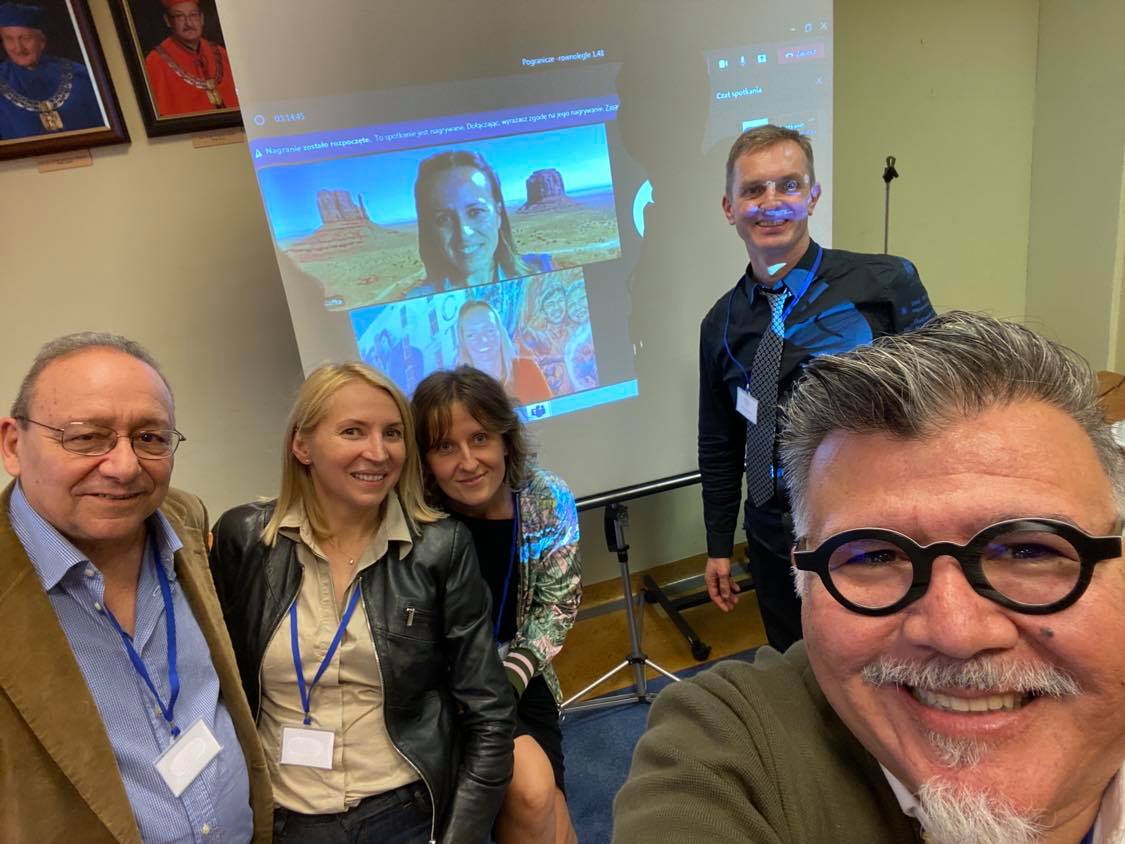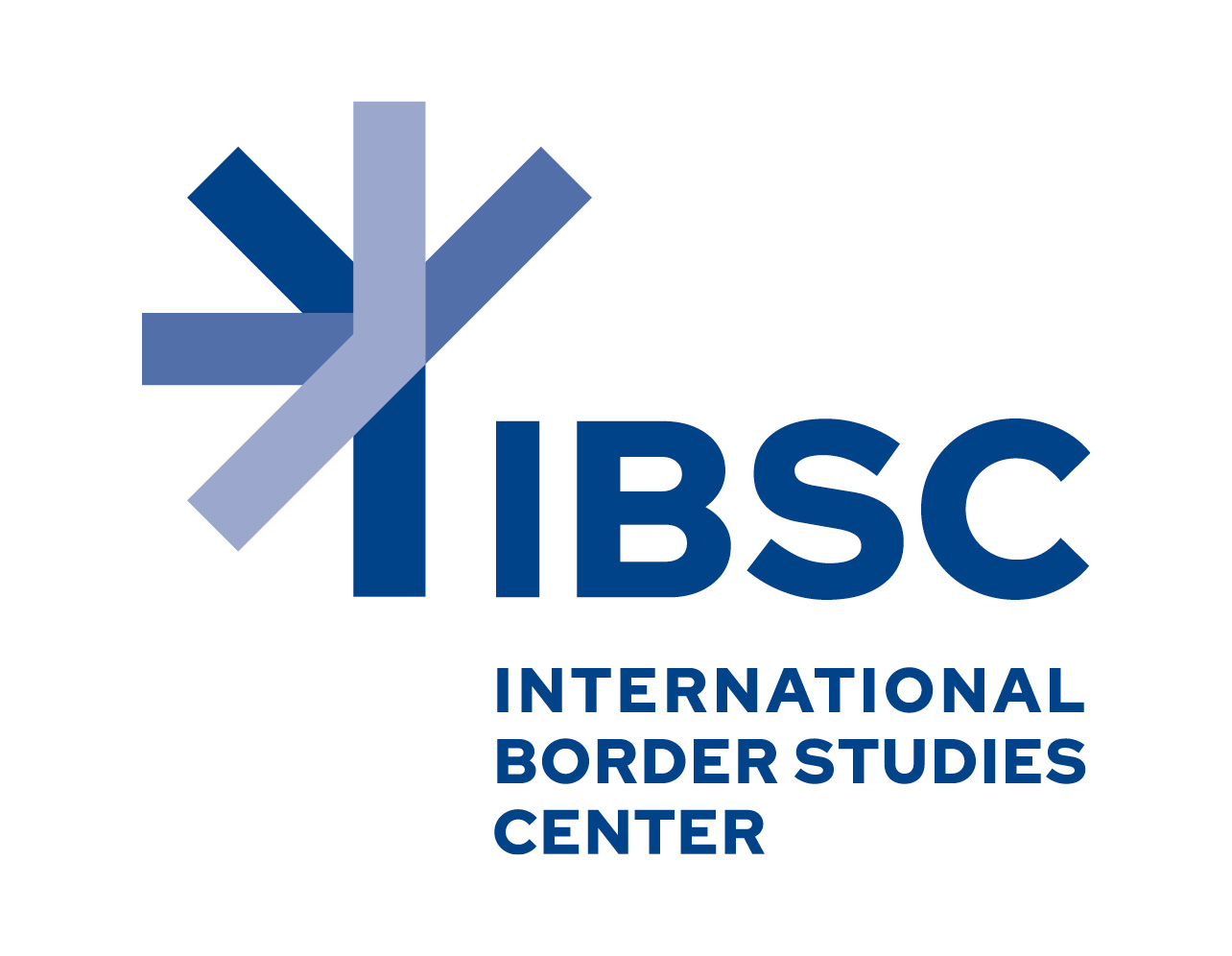Dreamscape
by Rickerby Hinds
Synopsis: Dreamscape depicts the death and inner life of a young woman, “Myeisha Mills,” who dreams though the impact of the twelve bullets that kill her. A meditation and reimagining of the night of December 28, 1998, when nineteen-year-old Tyisha Miller was shot and killed by four Riverside Police Department officers while she lay unconscious in a car; the play takes a powerfully clear-eyed look at the relationships between race, the body, and violence.
Through Beatboxin’, spoken word and dance the performance is structured around an autopsy report recited by a dispassionate coroner. As each of the twelve bullet wounds is described in horrifying clinical detail—the damage done to the arm, shoulder, scalp, teeth, thigh, neck, back, breast, eye, mouth, skull—Myeisha reminisces about her life, using each body part as a jumping off point. She describes the pleasures of softball, dancing, kissing, and hair styling with sweetness, humor, and all the insight of a nineteen-year-old.
Dreamscape Performers:
Natali Micciche
John “Faahz” Merchant
Dreamscape Performance, SDK, Warsaw, Poland
https://www.youtube.com/watch?v=Qrdnj5pljek&t=2s
South Coast Repertory Theater – Studio SCR series Dreamscape promotional video
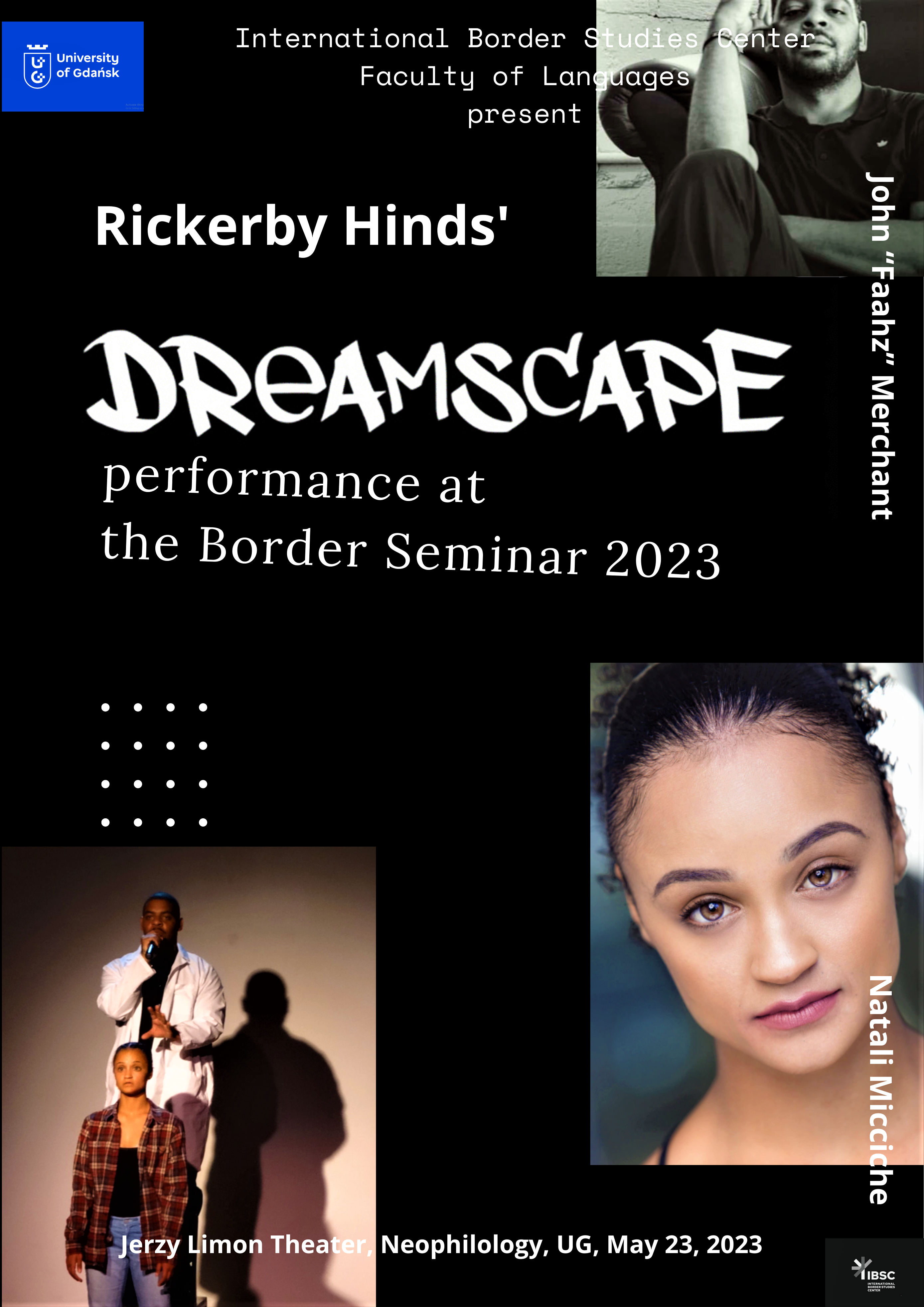


Call for Participants!
Faculty of Languages, Andrzej Wajda Film Center
International Border Studies Center
invite to
Gdansk City Symphony: Border Metropolis
Filmmaking Workshop with Jesse Lerner
May 15-19, 2023, from 4pm-6pm
Free, all you need is smartphone
Students at UG are invited to participate in a filmmaking workshop entitled Gdansk City Symphony: Border Metropolis. Led by American documentary filmmaker Jesse Lerner, visiting professor at UG, the workshop is part of the program of the Border Seminar 2023 international conference organized by the International Border Studies Center at UG. Participants will contribute their work to creating a 24-hour film on the life of Gdansk as borderlands metropolis.
To sign up for this workshop please go to: https://forms.office.com/e/Vgb1rjQc6F
NOTE: the number of participants is limited and cannot exceed 25. Deadline to sign up: April 30, 2023.
Gdansk City Symphony: Border Metropolis by Jesse Lerner:
Inspired by the international cycle of city symphony films of the 1920s avant-garde (Berlin: Symphony of a Great City, Man with a Movie Camera, etc.), this intensive workshop will produce a symphony of 24 hours in the life of Gdansk, with an emphasis on the city as a border zone, a crossroads of cultures, and a hub of trade, migration, and commerce. Students will work collectively to conceptualize, shoot, edit, and create a soundtrack for the short documentary project.
WRITING FRONTERIZO! Creative Writing Workshop with Chicano Authors
Border Seminar 2023 workshop in drama, poetry, and prose
International Border Studies Center
Faculty of Languages, UG, May 22-23, 25, 2023
Hosted by: Playwright Carlos Morton (UCSB, IBSC/UG) and Essayist/fiction writer Santiago Vaquera-Vásquez (UNM Albuquerque, IBSC/UG)
Sign up at: https://forms.office.com/e/t6Zs7KcU8V
Deadline for sign up: May 18, 2023 at 23:00.
Creative Writing Workshop Syllabus by Carlos Morton
https://drive.google.com/file/d/16Xd0YGcQ-45V-tL7PpI40EJ9AKMDSViS/view?usp=sharing
Santiago Vaquera-Vásquez espouses the critique of “migritude”. His epistemic and aesthetic orientation can be termed as pensamiento fronterizo. He proposes a “migratory aesthetics” of the “unbearable lightness of being fronterizo” where the sense of lightness is the result of in-betweenness and freedom engendered by the borderlands. Thus, a fronterizo practice undermines reifying narratives and posits contestatory strategies for emerging cultures.
Carlos Morton’s work, driven by his Taoist sense of mestizaje, is part morality play and commedia del’ arte, utilizes archetypes, the picaro and ritual. His theater is “necessary”, both entertaining and vital to the well-being of the community it addresses. In 2022 Morton wrote Trapped in Amber, a play about Gdańsk as the border region. Morton returns now with his script hoping to collaborate on writing more scenes.
During the workshop Vaquera-Vásquez and Morton will offer an introduction to the theoretical/imaginary horizon of fronterizo and mestizo thinking and aesthetics. The writing exercise involves using this model to create a new scene for Morton’s play Trapped in Amber, to write a narrative in prose about one of its characters, or a poem based on the play or history of the region, its everyday life, or even a memory/confession from a particular day in one’s life in the city, etc. Participants will also be able to develop soundtrack and staging ideas. Through fronterizo thinking the workshop is intended to engender a sense of entanglement of one’s practice, of connection between individual and communal history, between the moment in time and eternal myth. It’s larger than us. We live therefore we cross.
Participants are asked to read Morton’s script TRAPPED IN AMBER before May 22. Click this link to access the text:
Readings and discussion of results: Thursday, May 25, 2023.

Jesse Lerner, Claremont Colleges, CA
Visiting Professor at the University of Gdańsk in May 2023
Jesse Lerner is a filmmaker, curator, and writer. His documentaries Frontierland/Fronterilandia (1995), Ruins (1999), The American Egypt (2001), Atomic Sublime (2010), The Absent Stone (2013) and The Fragmentations Only Mean (2021) have screened at the New York’s Museum of Modern Art, the National Anthropology Museum in Mexico City, the Guggenheim Museums in New York and Bilbao, and the Sundance, Rotterdam, and Los Angeles Film Festivals, among many other venues. Washington’s National Gallery, the Anthology Film Archives, and Mexico’s Cineteca Nacional have presented mid-career surveys of his films. His books include The Maya of Modernism, F is for Phony: Fake Documentary and Truth’s Undoing, The Shock of Modernity, Ism Ism Ism, and The Catherwood Project. As a curator, he has organized exhibitions for the Robert Flaherty Seminar, Mexico’s National Palace of Fine Arts, the MAK Center, the Museo Carrillo Gil, and the touring series Mexperimental Cinema. He is a professor in the Intercollegiate Media Studies program of the Claremont Colleges.
To learn more about Jesse Lerner’s work, visit: www.TheAmericanEgypt.com
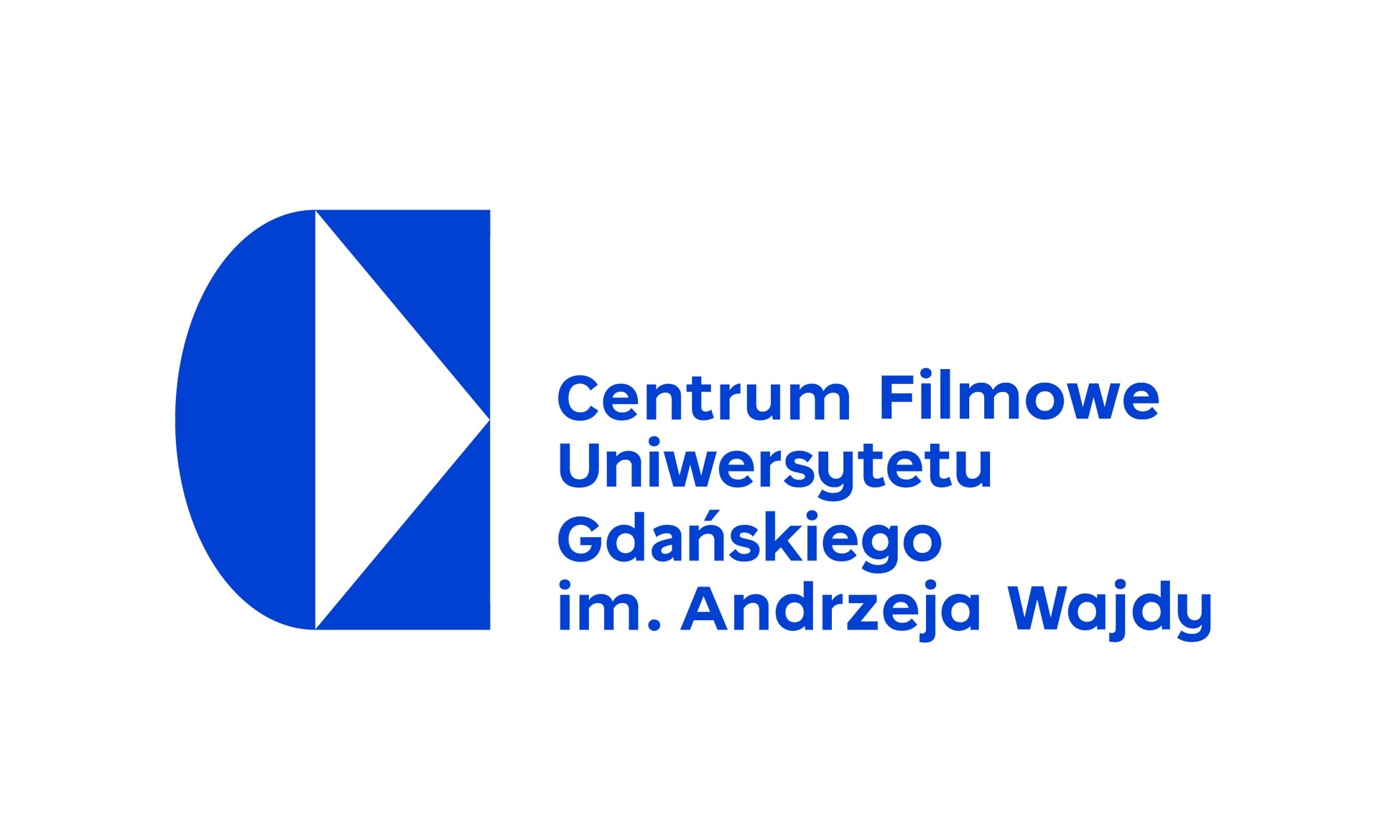
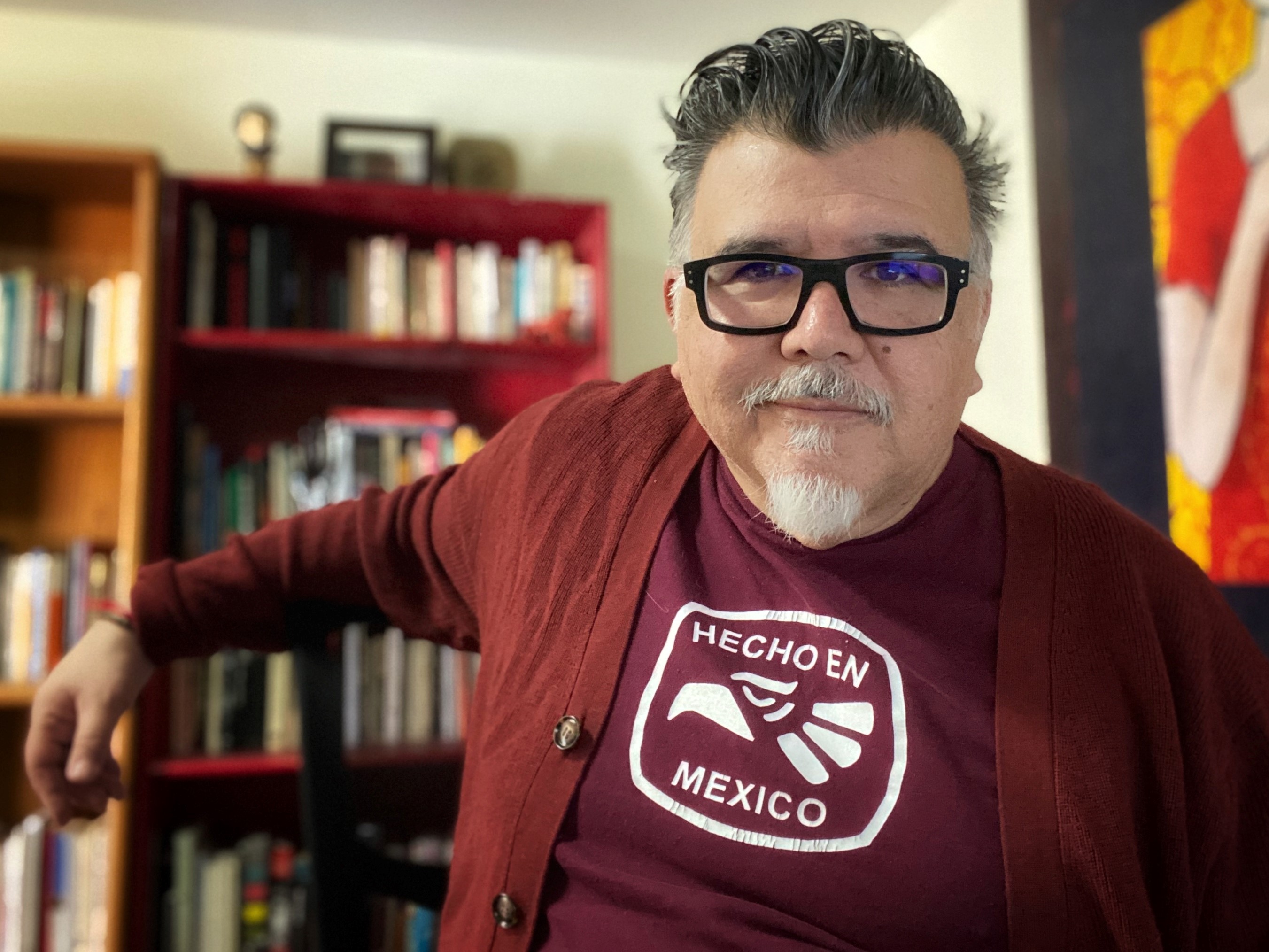
Santiago Vaquera-Vásquez – unrepentant border crosser, ex-dj, and Xicano writer. An Associate Professor of Creative Writing and Hispanic Southwest Literatures and Cultures at the University of New Mexico, he has also taught and lectured at universities across the United States, Latin America, and Europe. He has also held Fulbright Fellowships in Spain, and Turkey, and served as a Fulbright Specialist in Poland. His books include, Luego el silencio (2014), One Day I’ll Tell You the Things I’ve Seen (2015), En el Lost ‘n Found (2016), Yabancı [Foreigner] Extranjero (2019) and Nocturno de frontera (2020). Commenting on his writing, Junot Díaz has said “Santiago Vaquera is literary lightning. He impresses, he illuminates, and when he is at his best you are left shaken, in awe.”
Carlos Morton – Chicano playwright and critic Morton has been active in the Chicano and American Theater since the 1970s. He is one of the most prolific and recognized Chicano Theater author. His plays are often situated in the American borderlands, bilingualism is the norm and migration is a common topic. His dramas are tragi-comical, expressive of cultural mestizaje or the mindset of a Taoist cosmopolitanism. In 2022, commissioned by the IBSC he wrote Trapped in Amber or Zaklęte w Jantarze, a play about Gdańsk as the borderlands, partly inspired by Gunter Grass’ The Tin Drum.
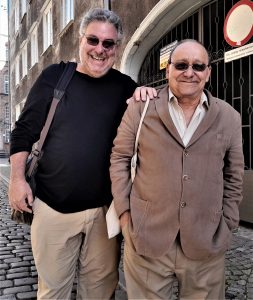
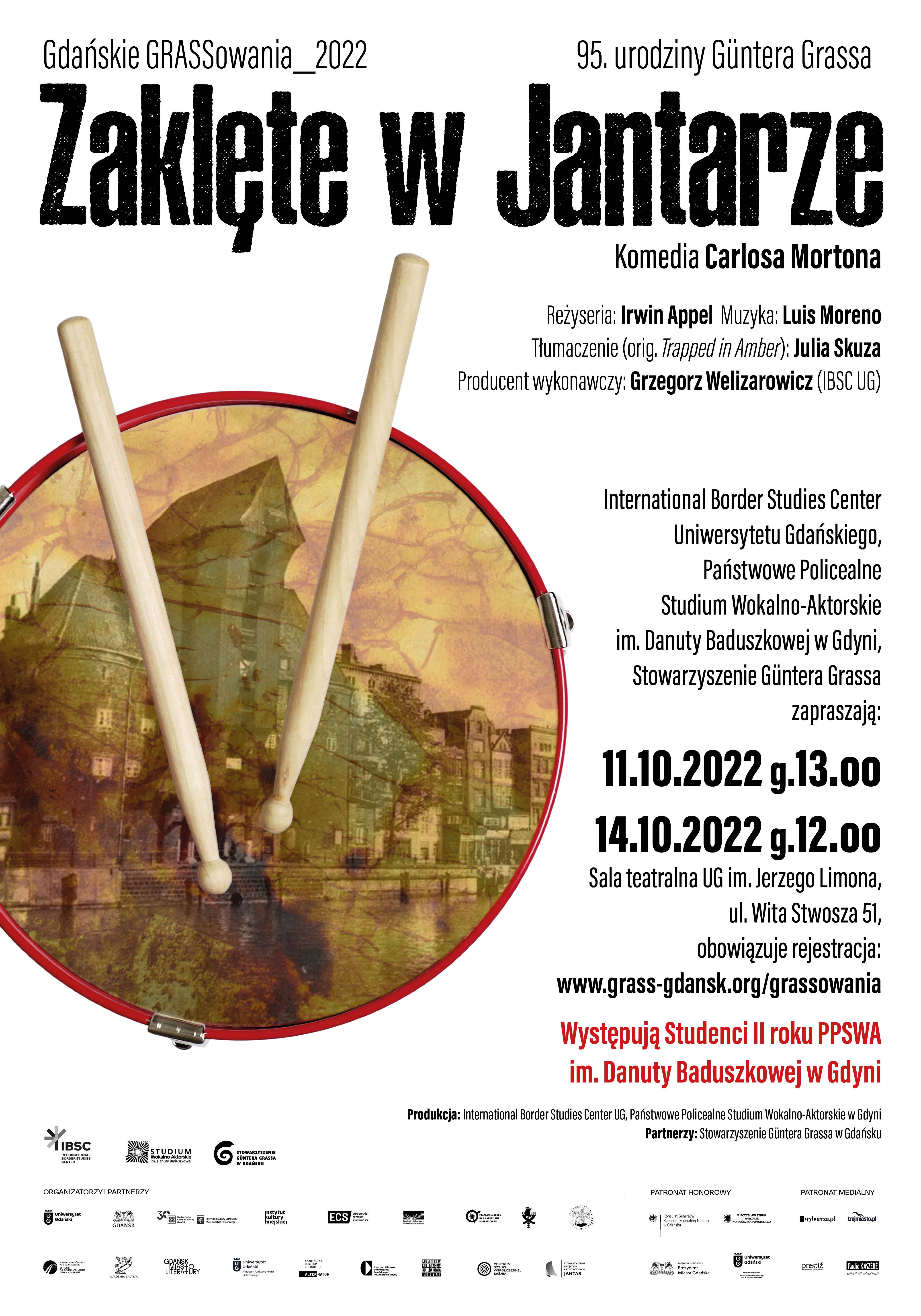
ZAKLĘTE W JANTARZE orig. Trapped in Amber
spektakl prezentowany w ramach Gdańskiego GRASSowania_2022
tekst: Carlos Morton
reżyseria: Irwin Appel
muzyka: Luis Moreno
przekład: Julia Skuza
występują: studenci II-roku PPSWA im. D. Baduszkowej w Gdyni
termin
11/10/2022 (wtorek) 13.00 oraz 14/10/2022 (piątek) 12:00
miejsce
sala teatralna im. Jerzego Limona, UG budynek Neofilologii
wstęp
obowiązuje rejestracja http://grass-gdansk.org/grassowania/
Tego jeszcze nie było! Na pewno pierwsza sztuka Chicano o historii Gdańska i w dialogu z Grassem wyreżyserowana przez amerykańskiego Żyda i zagrana przez młodych aktorów z Baduszkowej!
Zaklęte w Jantarze jest komedią muzyczną o historii Gdańska jako pogranicza napisaną przez amerykańskiego dramatopisarza Latino Carlosa Mortona. W czerwcu 2022 Morton odbył z amerykańskim reżyserem Irwinem Appelem rezydenturę artystyczną „Gdańsk czyli pogranicze” na Międzynarodowym Centrum Studiów nad Granicami (IBSC) na Uniwersytecie Gdańskim. Doszło wtedy do scenicznego odczytania Trapped in Amber, oryginalnej wersji sztuki w reżyserii Appela i koprodukcji IBSC z Państwowym Studium Wokalno Aktorskim im. D. Baduszkowej (PPSWA).
Podczas Gdańskiego GRASSowania_2022 dojdzie do pierwszego scenicznego wykonania Zaklętych w Jantarze w wersji polskiej w tłumaczeniu Julii Skuzy. Spektakle z udziałem autora. Przewidziana dyskusja po spektaklach.
W serii szybkich scen przeplatanych licznymi piosenkami Zaklęte w Jantarze przedstawia wybrane epizody z historii Gdańska i regionu od roku 1659 do współczesności. Sztuka jest próbą dialogu amerykańskiego autora z twórczością Güntera Grassa; zamysł narracyjny oraz idee niektórych scen zaczerpnięte zostały z Blaszanego Bębenka i innych tekstów i przefiltrowane przez wrażliwość i doświadczenie autora, który od lat 1970. pozostaje jednym z wiodących twórców teatru Latino w USA, był współpracownikiem m.in. San Francisco Mime Troupe i jest laureatem New York Shakespeare Festival.
To wybuchowa historia, pełna humoru, wzruszeń, namiętności i ludzkich nadziei na tle wiatrów dziejów. Skompresowana w czasie opowieść miesza fakty z mitem i fikcją, farsa sąsiaduje z liryką i melodramatem, wiec z dokudramą i musicalem. To moralitet o losie i sile przetrwania zwykłych ludzi w zderzeniu z historią i jej wielkimi projektami jak wojny, nacjonalizmy, Kontr-Reformacja, Komunizm, itp. Morton często miesza rzeczywistość z
archetypem. Spektakl ma wartki rytm, bogatą warstwę muzyczną i atrakcyjną formę wizualną opartą o żywiołową grę aktorską i nieszablonowe reżyserskie rozwiązania inscenizacyjne. Appel posługuje się obrazem, rytmem, chórem.
CARLOS MORTON jest utytułowanym kalifornijskim dramaturgiem Chicano i profesorem teatru University of California Santa Barbara. Jego sztuki zainteresowane są obszarem pogranicza meksykańsko-amerykańskiego, migracjami, historią kolonizacji. Stylistycznie porusza się w obszarze commedii dell’arte, Brechta, docudramy, teatru ulicznego.
IRWIN APPEL jest reżyserem amerykańskim pochodzenia żydowskiego. Specjalizuje się w spektakularnych realizacjach szekspirowskich i jest twórcą metody aktorskiej Naked Shakes. Jest Dyrektorem Wydziału Teatru i Tańca University of California Santa Barbara.
LUIS MORENO jest muzykiem i kompozytorem Chicano z Santa Barbara. W latach 1970. i 1980. występował w zespołach muzycznych takich jak El Teatro Campesino, Mestizo, zespół Francisco Gonzaleza (Los Lobos). Od lat jest czołową postacią sceny Old California i Chicano music w Santa Barbara w Kalifornii.
producent wykonawczy
Grzegorz Welizarowicz (IBSC UG)
produkcja
International Border Studies Center, Uniwersytet Gdański
Państwowe Policealne Studium Wokalno-Aktorskie w Gdyni
partnerzy
Stowarzyszenie Güntera Grassa w Gdańsku
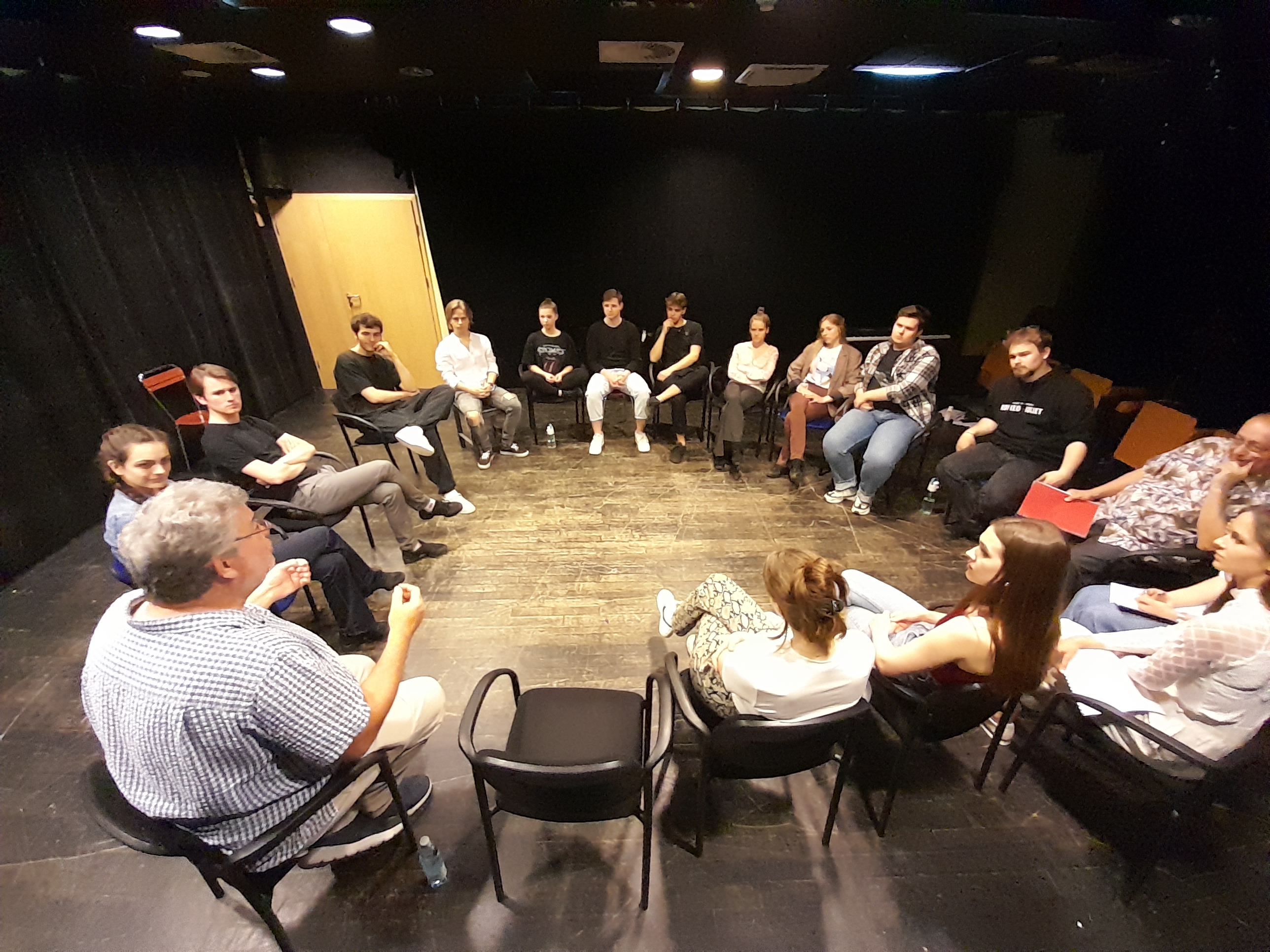
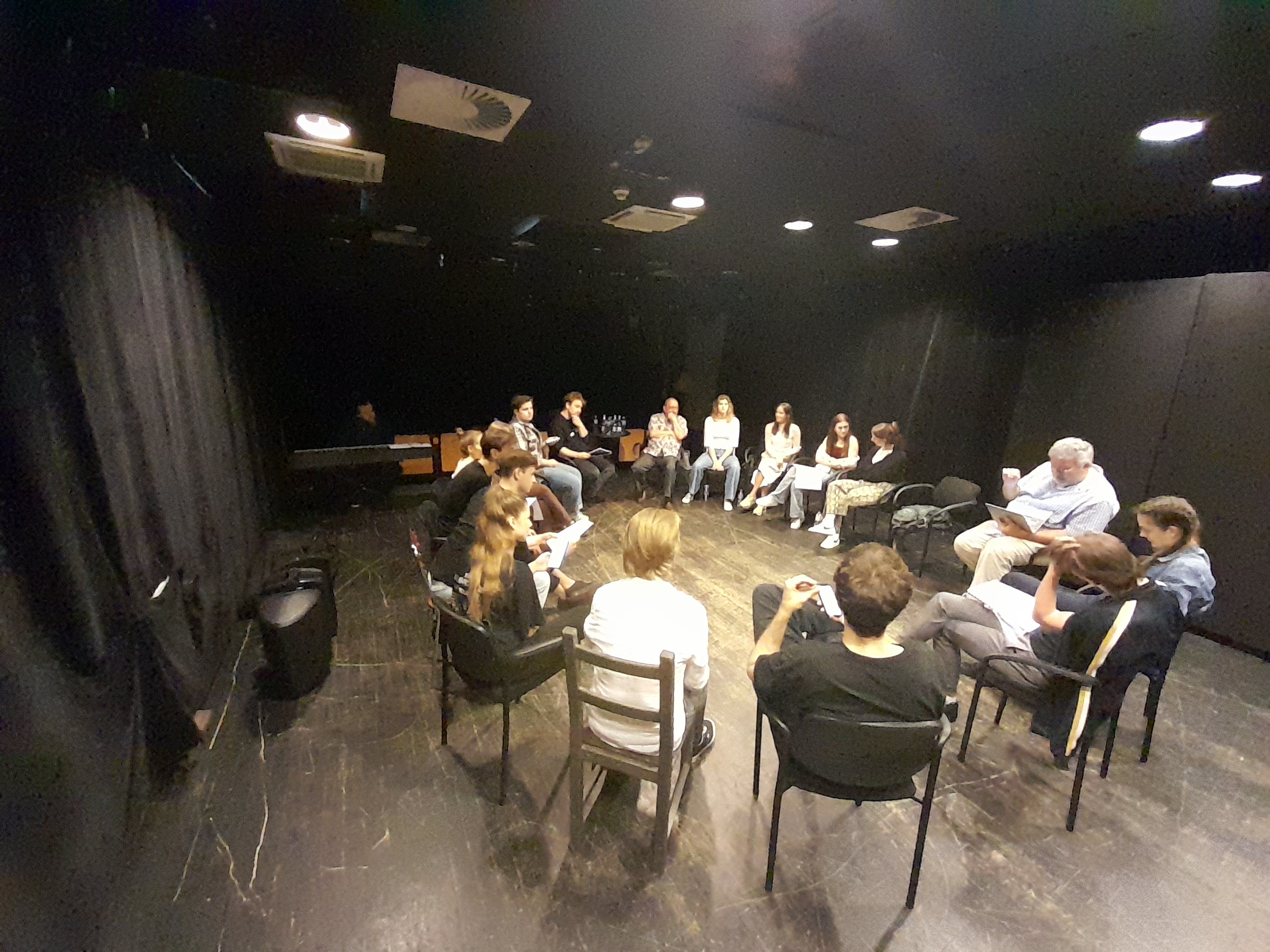
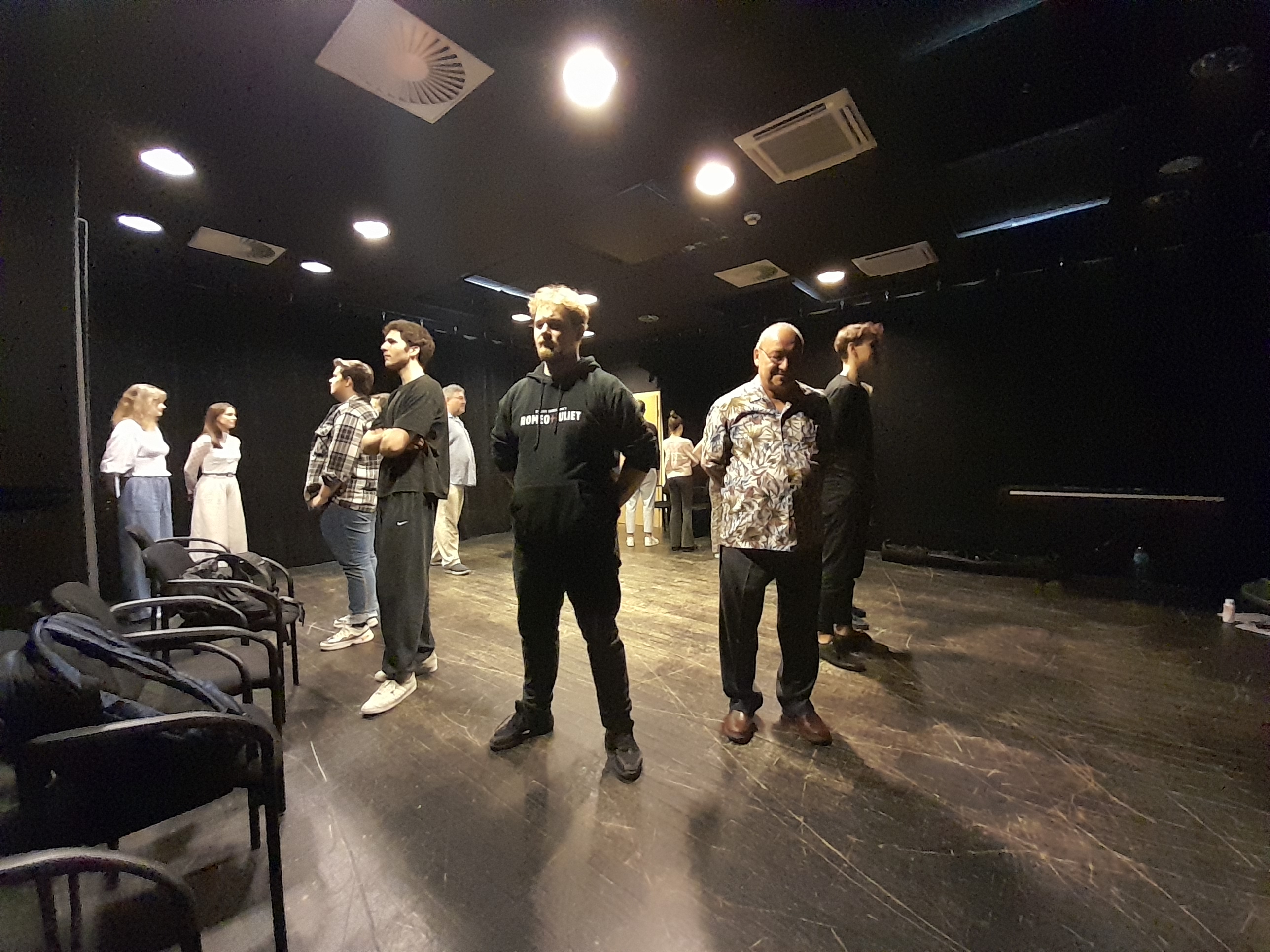
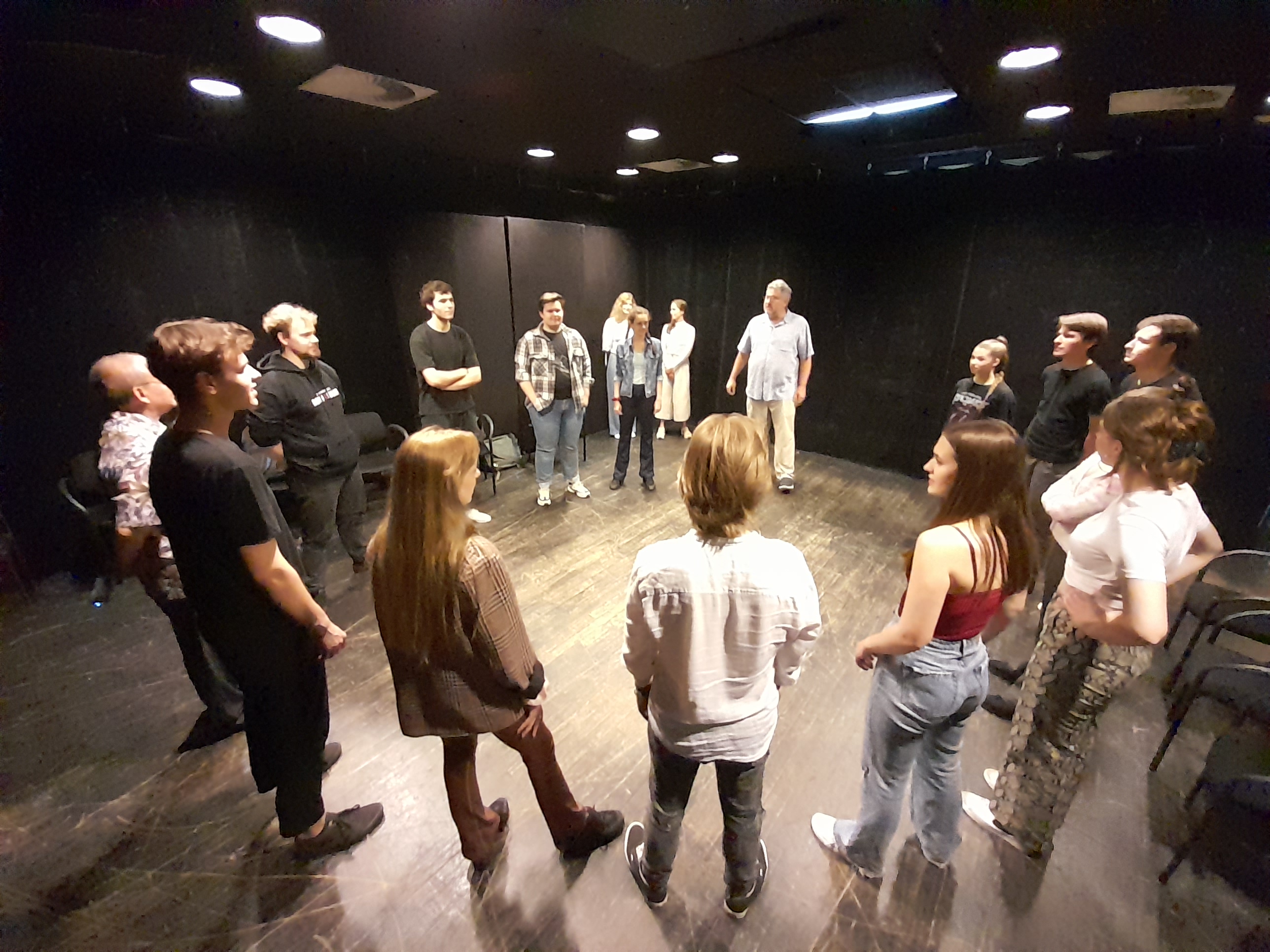
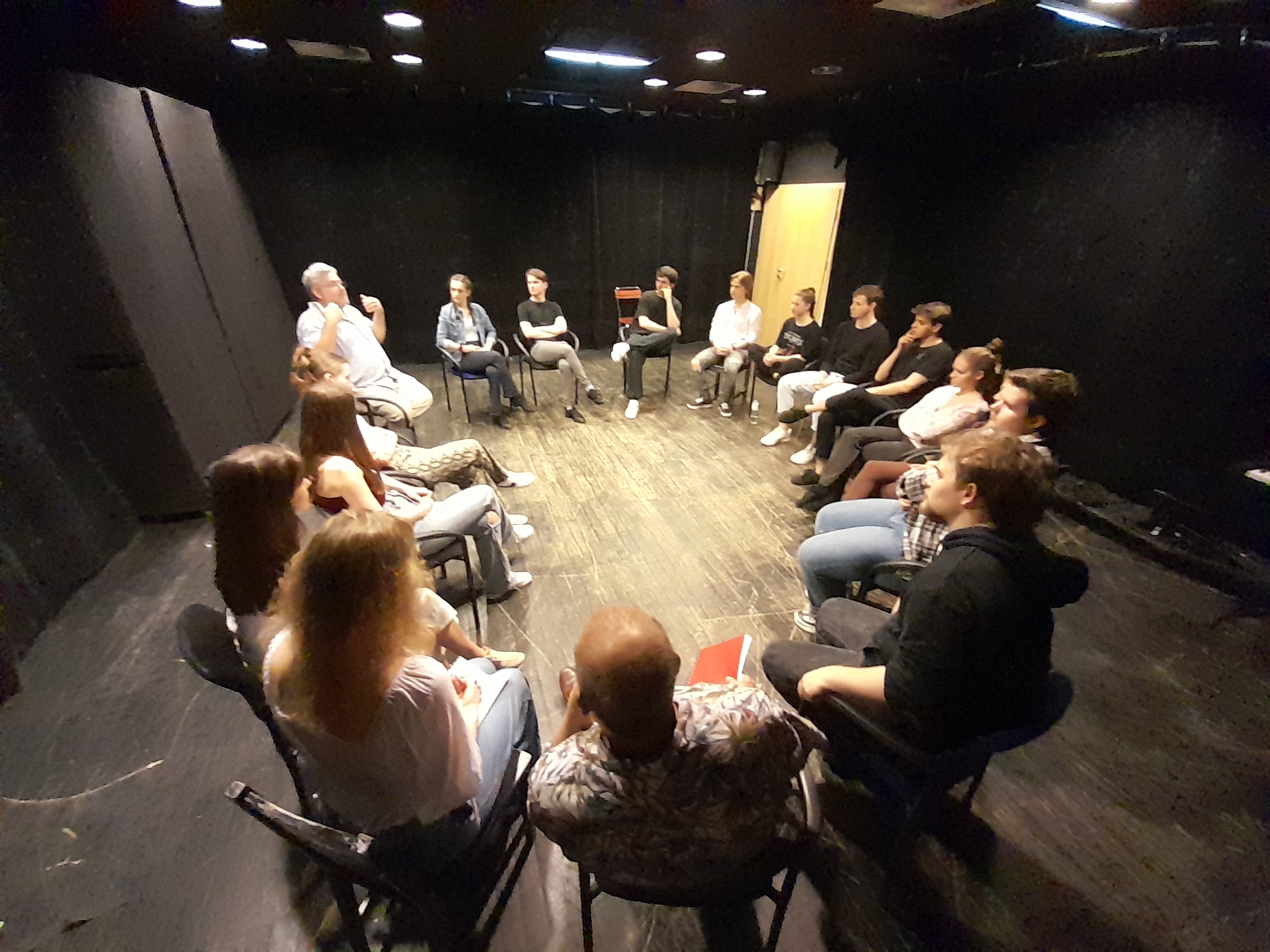
Directed by Irwin Appel
Music by Luis Moreno
Performed by students of the Studium Wokalno-Aktorskie im. Danuty Baduszkowej w Gdyni:
Maria Bach
Szymon Czerski
Łukasz Gładysz
Mateusz Górecki
Kacper Jędrzejowski
Natalia Kaczanowska
Paweł Kiedrowski
Weronika Radniecka
Aleksandra Rowicka
Łukasz Szerszeń
Mieszko Wierciński
Karolina Ziętek
Produced by the International Border Studies Center, University of Gdańsk
Współpraca translatorska/Cooperation in translation: Julita Panasko, Weronika Wianecka
Trapped in Amber/ Zaklęte w Jantarze by Carlos Morton
Active in theater since the 1970s and a former writer of The San Francisco Mime Troupe Carlos Morton is the leading Chicano/Latino playwright. IBSC has asked Morton to write a play about Gdansk as the borderlands.
Trapped in Amber is loosely based on Gunter Grass’ The Tin Drum and on other myths and stories collected by Morton from the history of Gdansk. The imaginative retelling of this history is done in the style of the commedia del’arte and Chicano theater. It is a fast-paced history lesson to music, served with ham and wry it is entertaining, moving and thought -provoking.
The first staged reading took place on June 11, 2022 at the Scena kameralna of the Music Theater in Gdynia. It was performed by the first years students of the Państwowe Studium Wokalno-Aktorskie im. Danuty Baduszkowej in Gdynia. It was directed by Irwin Appel, chair of the Department of Theater and Dance at the University of California Santa Barbara. The staged reading was preceded by a 3 days of intensive workshop.
Production partners:
Państwowe Studium Wokalno-Aktorskie im. Danuty Baduszkowej; International Border Studies Center; Stowarzyszenie Güntera Grassa w Gdańsku (konferencja i koordynacja obchodów); Zakład Amerykanistyki UG
Carlos Morton is an American playwright who has been one of the leading figures of the Chicana/o theater movement since in the 1970s. Morton is former Mina Shaughnessy Scholar and Fulbright Lecturer to Mexico, Morton holds a M.F.A. in Drama from the University of California, San Diego, and a Ph.D. in Theatre from the University of Texas at Austin. In 1999 he was inducted into the “Writers of the Pass,” in El Paso, Texas. Morton’s published collected plays include, The Many Deaths of Danny Rosales and Other Plays (1983) and Johnny Tenorio and Other Plays (1992) both published by Arte Publico Press. The Fickle Finger of Lady Death (1996, Peter Lang Press) are English language translations of four plays by contemporary Mexican playwrights Rancho Hollywood y otras obras del teatro chicano, (1999, Arte Publico Press & Ediciones EL Milagro) is a Spanish language collection of his plays; Dreaming on a Sunday in the Alameda and Other Plays (Chicana & Chicano Visions of the Americas) (2004) on University of Oklahoma Press.
Irwin Appel is Professor and Chair of the Department of Theater and Dance at University of California Santa Barbara. As a professional director, Equity actor and composer/sound designer, he has worked with the Shakespeare Center of Los Angeles, Shakespeare Santa Cruz, Orlando Shakes, the New York, Oregon, Utah, New Jersey and Colorado Shakespeare Festivals, Southwest Shakespeare Company, The Acting Company, Theatre For a New Audience, Hartford Stage, Indiana Repertory Theatre, Arizona Theatre Company, PCPA, both the National Theatre Conservatory and Colorado New Play Summit at the Denver Center of the Performing Arts, the Bread Load Acting Ensemble, and other prominent regional theaters. In Europe, he acted the role of Pandarus in Troilus and Cressida in the Czech Republic with the Prague Shakespeare Company at the renowned Estates Theatre where Mozart premiered Don Giovanni in 1787. He is the founder of Naked Shakes producing Shakespeare’s plays in the United States and internationally since 2006. For Naked Shakes, he has created two major adaptations of Shakespeare’s plays: first, The Death of Kings combining eight Shakespeare history plays from Richard II through Richard III into one event that has been performed in California, Arizona and the Czech Republic. Second and most recently, he combined Shakespeare’s Antony and Cleopatra and Julius Caesar, along with parts of George Bernard Shaw’s Caesar and Cleopatra into one play entitled Immortal Longings. He has also has led workshops and lectured about Naked Shakes in China, Greece, Switzerland, Poland, and Czech Republic. He especially loves working in Gdańsk where he had the honor of leading a workshop on the Naked Shakes model on the stage of the Gdańsk Shakespeare Theater. He is a graduate of Princeton University and the Juilliard School. HYPERLINK “http://www.deathofkings.com” www.deathofkings.com
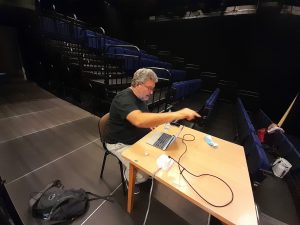
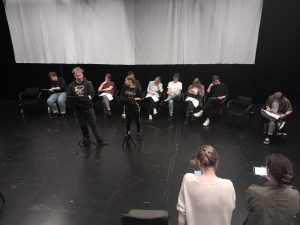
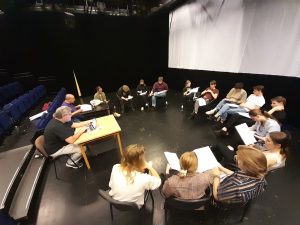
See video previews of the rehearsal for: Trapped in Amber by Carlos Morton, Irwin Appel, director (performed by students of Panstwowe Studium Wokalno Aktorskie im. Danuty Baduszkowej w Gdyni, Scena Kameralna Teatru Muzycznego 11.06.2022) More video clips are available here: https://ibsc.ug.edu.pl/vlogs/
Border Storytelling Workshop, Friday-Saturday, September 17-18, 2021
Leaders: Santiago Vaquera-Vazquez (UNM Albuquerque), Carlos Morton (UC Santa Barbara)
Particpants : Magda Bodzan, Ewa Antoszek, Ewelina Bańka, Ewa Ślęzak, Machteld Venken, John Dunn, Grzegorz Welizarowicz, and others
The Border Storytelling Workshop lead by Professor Santiago Vaquera-Vasquez, Chicano writer and scholar, and Professor Carlos Morton, Chicano playwright, was designed to be an exercise in creative engagement and border pedagogy using creative writing as part of the classroom work.
The workshop consisted of two parts:
- Preliminary discussion: the meanings of the border and strategies of (artistic) approach.
- Task to create a piece, an artwork, a creative project (for example by engaging the folklore of one’s family), a border story, a drawing, a piece of action, a place followed by discussion of results, advise, sources for future study.
Themes discussed in parts 1 and 2:
- What does a border mean to you?
- What kinds of borders do you see around you?
- Why do we live in haunted places?
- Memories, echoes of the past
- How does the repressed come back?
- Burdens we have to negotiate
- Genetics, haunted past
- Schengen, the invisibility of the border, the border is everywhere
- Crossing the U.S. border
- Privileges of whiteness
- Liberating power of borders because they subject one to face conditions
- Affects of the border: violence, stress, harassment, pressure
- Healthy borders
- Authors and activists (Denise Chavez)
- Borders in the academia
Discussion in Part 2 specifically concentrated on response to participants’ individual projects and on highlighting the toolbox of storytelling: 1. Mystery from which invention comes; 2. Highlighting ideas (smell, heat, time, etc.); 3. Central image and images; 4. Dramatist’s questions: who is the protagonist and antagonist? How do we set the scene? What suspense? Exposition? Points of view? Reasons for crossing? What’s at stake?; 5. Rhetoric of the border, misunderstandings; 6. Tension; 7. Stages of affect; etc. 8. Selection of moments; 9. Arrangement of material; 10. Auto-ethnography; 11. Frames.
Most of the participants contributed their creative or improvised projects and the discussions about these and other issues were engaging and fruitful. It is hoped that such workshops can be continued in the future with students’ engagement welcome.
Carlos Morton left for us his resources for writing a 10-minute play and a description of his latest project: Proyecto Caravana.
Thank you to our wonderful leaders and border crossers!
